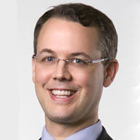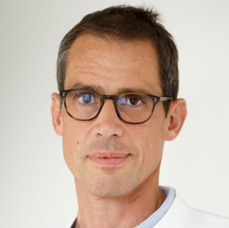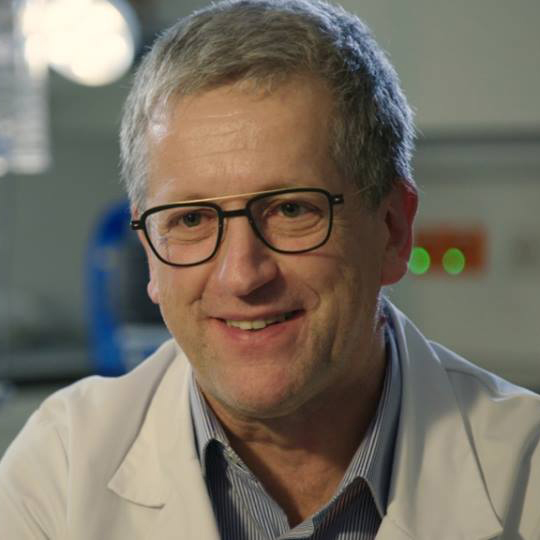touchEXPERT OPINIONS What’s on the horizon for the treatment of solid tumours in 2019?
Stay up to date with the latest developments in the treatment of solid tumours with our expert summary of what is expected at the ESMO Congress in Barcelona, Spain, 27 September–1 October 2019.
Dr Hendrik-Tobias Arkenau (Executive Medical Director of the Sarah Cannon Research Institute, London, UK), Prof. Dirk Jäger (Head of the Medical Oncology Department, University Hospital Heidelberg, Germany) and Prof. Eric Van Cutsem (Head of Clinical Digestive Oncology, KU Leuven, Belgium) review the most important challenges in treating solid tumours and how emerging data expected at the ESMO Congress 2019 could influence the future clinical management of solid tumours.
Hendrik-Tobias Arkenau, founding Medical Director of the Sarah Cannon Research Institute UK (SCRI UK), provides his expert insight into the key data for solid tumours and what he expects at the 2019 ESMO Congress. He discusses the importance of understanding tumour biology in directing therapeutic advances and the clinical management of patients with solid tumours.
1/3 Next Interview- Which are the most challenging solid tumours to treat in your region?
- How has the treatment of solid tumours evolved over the past decade?
- What are the limitations of current therapeutic approaches to solid tumours?
- What do you consider a ‘targeted’ therapeutic approach?
- What direction should the development of new therapeutic approaches for solid tumours take?
- Which data or developments are you most looking forward to seeing at ESMO 2019?
Dr Arkenau is the founding Medical Director of Sarah Cannon Research Institute UK (SCRI UK), Clinical Lead for the Hospital Corporation of America International Cancer Service Line and Professorial Research Associate at University College London (UCL). He has vast experience in Early Oncology Clinical Drug Development, with a special interest in gastrointestinal cancer and melanoma.
At SCRI UK, he works as part of a multidisciplinary team of >40 members where research incorporates all aspects of modern drug development from clinical pharmacology, molecular profiling to early clinical trials (>80), with the aim of incorporating oncology drug development into day-to-day clinical practice to improve patient care. Dr Arkenau is actively involved in protocol development, toxicity review, pharmacokinetic analysis, biomarker and strategic development of new anti-cancer drugs, including immunotherapies.
Dr Arkenau is a Fellow of the Royal College of Physicians and is a member of the German Cancer Society, ASCO, AACR and ESMO. He has presented multiple talks on the latest research in oncology and has spoken at several national/international meetings.
Dr Arkenau has published articles in several high-ranking international peer-reviewed journals and serves as Contributing Associate Editor-in-Chief of the World Journal of Gastroenterology and Associate Editor of World Journal of Cancer Research.
Disclosures: Advisory Board Member for Beigene, Bicycle, Guardant, Iovance, Merck Serono, Roche and Servier.
Dirk Jäger, Director of the National Centre for Tumour Diseases in Heidelberg, Germany, provides his expert insight into the latest data relating to the management of solid tumours, including the different immunotherapy approaches, how these could guide future approaches in clinical practice and what he expects from the 2019 ESMO Congress.
2/3 Next Interview- What role does precision medicine play in the treatment strategies for solid tumours?
- What is the current understanding of the pathophysiology of drug resistance in solid tumours?
- What data are available regarding the development of new treatment combinations and sequences to overcome resistance?
- How are new combinations and sequencing of therapy addressing issues of toxicity?
- What data do you think will be the most interesting regarding combination treatment and sequencing strategies at ESMO 2019?
Prof. Jäger is Director of the National Centre for Tumour Diseases (NCT) and Head of Department of Medical Oncology at the University Centre in Heidelberg. He is also Head of the research group ‘Applied Tumour Immunity’ at the German Cancer Research Centre (DKFZ).
He began his scientific career at the Cancer Research Institute at Cornell Medical Center, New York, USA and the Ludwig Institute, New York Branch. Subsequently, he joined the Department of Haematology/Oncology, Krankenhaus Nordwest, Frankfurt, Germany as Head of the Research Group ‘Tumour antigen identification and characterization’ (2001–2003). He moved on to the University Hospital Zürich, Switzerland where he became Principal Investigator at the Laboratory for Tumour Immunology in the Oncology Department (2003–2005). Since 2005, he has worked at the NCT in Heidelberg.
His research focuses on the characterization and better understanding of tumour host immune interactions at the tumour site and the development of novel treatment strategies to therapeutically interact in this immunological interplay.
Disclosures: Received honoraria from Amgen Inc., CureVac AG, Definiens AG, Genmab A-S, F. Hoffmann-La Roche Ltd, Life Science Inkubator GmbH and VAXIMM AG.
Eric Van Cutsem, Head of Digestive Oncology at the University of Leuven and University Hospitals Gasthuisberg, Belgium, provides his expert insight into the challenges in treating solid tumours and how there has been a shift towards immunotherapy, including combination and sequential therapy approaches, as well as the use of biomarkers. He discusses these approaches to managing solid tumours, including gastrointestinal (GI) tumours, and what he thinks will be the focus at the 2019 ESMO Congress.
3/3 Leave Feedback- Which novel treatment strategies for gastrointestinal tumours do you think hold the most promise for patients?
- When would you consider monotherapy or combination therapy and how could new treatment options fit within this strategy?
- What influences the sequence of therapy in patients with gastrointestinal tumours?
- Where do you see upfront therapy for gastrointestinal tumours in 5 years’ time?
- What data regarding new treatment strategies do you think will be the most interesting at ESMO 2019?
Prof. Van Cutsem, Head of Digestive Oncology at the University of Leuven and University Hospitals Gasthuisberg, member of the Belgian Royal Academy of Medicine and President of the Belgian Foundation Against Cancer, has extensive experience in the development of new treatment strategies for gastrointestinal (GI) cancers, including drug development and the identification of molecular markers and diagnostic tools.
Prof. Van Cutsem has published >550 peer-reviewed articles with >64,000 citations and an H-Factor of 117, and has been ranked in the top three reputed colon cancer experts globally.
Prof. Van Cutsem co-founded the ESMO GI/World Congress on Gastrointestinal Cancer and is Chair of the 2019 ESMO Congress. He also serves/served on the board or key committee of several international societies, including ESMO, the American Society of Clinical Oncology (ASCO), the European Neuroendocrine Society (ENETS), the European Organisation for Research and Treatment of Cancer (EORTC), the European Cancer Organisation (ECCO) and the European Society of Digestive Oncology (ESDO), as well as on the patient advocacy groups, Europacolon and Digestive Cancers Europe.
Disclosures: None
Overview & Learning Objectives
Overview
Stay up to date with the latest developments in the treatment of solid tumours with our expert summary of what is expected at the ESMO Congress in Barcelona, Spain, 27 September–1 October 2019.
Dr Hendrik-Tobias Arkenau (Executive Medical Director of the Sarah Cannon Research Institute, London, UK), Prof. Dirk Jäger (Head of the Medical Oncology Department, University Hospital Heidelberg, Germany) and Prof. Eric Van Cutsem (Head of Clinical Digestive Oncology, KU Leuven, Belgium) review the most important challenges in treating solid tumours and how emerging data expected at the ESMO Congress 2019 could influence the future clinical management of solid tumours.
Learning Objectives
After watching this touchEXPERT OPINIONS, you should be able to:
- Identify solid tumour types with the greatest unmet clinical need in terms of effective new therapy approaches
- Discuss emerging data for new immunotherapies and targeted therapies in solid tumours and know how to identify patients that may benefit from these new treatments
- Evaluate the rationales for different combination and sequential therapy approaches with new agents in solid tumours

Register to touchONCOLOGY for FREE
- Peer-reviewed journals and expert opinions
- Interactive CME and e-learning modules
- Video conference highlights





